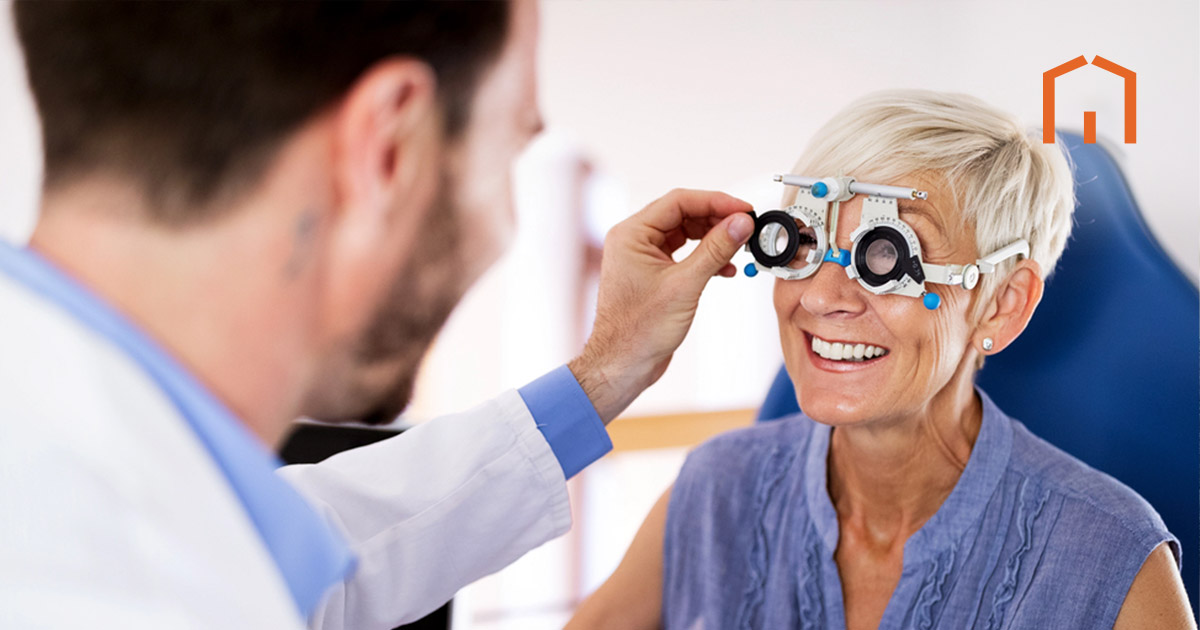

How Often Should Seniors Over 65 Get Their Eyes Checked?
As we get older, our bodies change; some of those changes can have a negative effect on our eyes and vision. People over the age of 65 should get their eyes checked more often—at least once a year.
Key Takeaways
- People aged 65 or older should have an eye exam at least once a year.
- People aged 65 or older are more prone to certain eye conditions.
- Some conditions that cause vision loss have no symptoms before vision loss occurs; eye exams can detect those conditions.
- Eye exams can help detect other conditions, like diabetes.
- Seniors should ask their optometrists questions about their eye health.
- Right at Home can help you manage your eye exam appointments and your eye care.
Health Risks of Vision Loss
The Manitoba Association of Optometrists recommend that seniors over 65 get a comprehensive eye exam every year. Vision loss comes in many forms, including blurred vision and distorted or cloudy vision. Your yearly eye exam can help detect conditions like:
- Glaucoma
- Cataracts
- Diabetic retinopathy
- Age-related macular degeneration
- Other age-related eye diseases
Poor eyesight and vision loss can lead to a number of health problems. The impact of vision loss cannot be understated: Poor vision can lead to lower mobility, lower levels of independence, worsened mental health and cognition, and other serious problems.
Seniors over the age of 65 are at greater risk of conditions that cause vision loss. Visiting an optometrist and getting a comprehensive eye exam yearly can help prevent and reduce the consequences of vision loss.
What Happens During Eye Exams
During an eye exam, your optometrist will perform a wide variety of tests, checking:
- Visual acuity to help determine if you need new glasses
- Colour vision
- Your peripheral vision
- The muscles around your eye
- Signs of eye disease
- Signs of diabetes
- Signs of tumours and other diseases
Eye exams also help to find diseases that aren’t directly related to your eyes—early detection of diabetes, high blood pressure, high cholesterol, lupus, multiple sclerosis, and other conditions is possible through eye exams.
Ideal Questions Seniors Should Ask
Your optometrist might ask a number of different questions about your eye health, including your medical history, family history, and more.
You have the right to ask questions to your optometrist, too. To better understand the tests your optometrist is performing and the overall state of your eye health, there are a number of questions you should ask:
- What tests are you performing?
- Why are you performing those tests?
- Can you explain the results of my tests?
- What eye problems have you found?
- How can I treat those eye problems?
- Are there steps that I can take to preserve my vision?
- Will my vision get worse over time?
- Are these conditions genetic? Is my family more likely to develop these conditions?
- What symptoms should I look out for?
- When I experience a symptom, what should I do? Should I visit you, my doctor, or the hospital?
Never be afraid to ask any questions you might have during the testing process—about the tests themselves, the machines being used, the results, or anything else! Once you’re done with your eye care appointment, be sure to schedule another one or schedule a reminder or follow-up call.
Eye Care With Diabetes
People with diabetes are more susceptible to developing cataracts, glaucoma, and other conditions than people without diabetes. A comprehensive eye exam can help detect these diseases. They can also help detect the early stages of diabetes.
How Right at Home Can Help
At Right at Home, we offer home care services in Winnipeg. These services are comprehensive: We can set eye exam appointments on your behalf, help you get to those appointments, remind you about the appointments, and more. We can also help you manage any medications that you might need to take as a result of eye conditions.
Preserve your vision and your quality of life—get an eye exam every year when you turn 65!
Why Right at Home?
- Over 20 years of experience. Right at Home has been providing award winning customized senior care and home care for over 20 years.
- YOUR Caregivers are all part of YOUR Care Team. This means that there is no revolving door of Personal Support Workers and Nurses. With the help of your Care Planner, you choose and get to know them. This leads to an level of care for your loved one that is unsurpassed in our industry.
- Working with government support. Your Care Planner will work to help you find the government supports you are eligible for (if you would like them) and then work to find a solution for the care needs that go above what government and family can do. We will also work around the government care plan so that we are enhancing it.
We help in home, wherever home is to you.
Our Caregivers are always out in the community visiting homes, Retirement Residences, Long Term Care (LTC), hospices and hospitals.